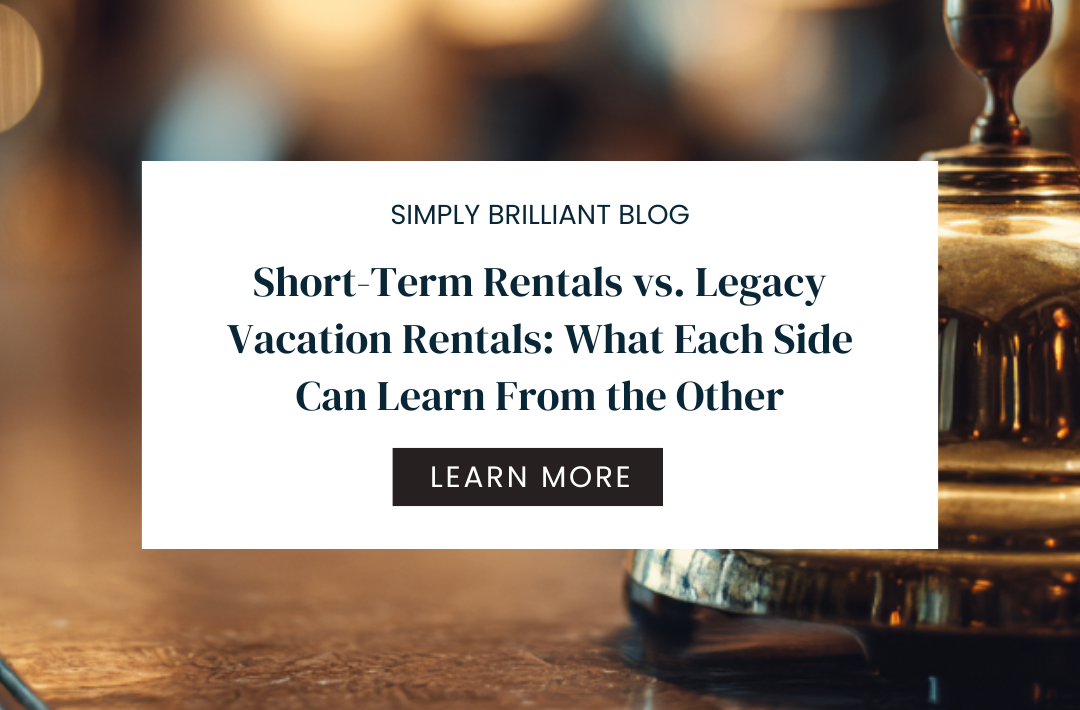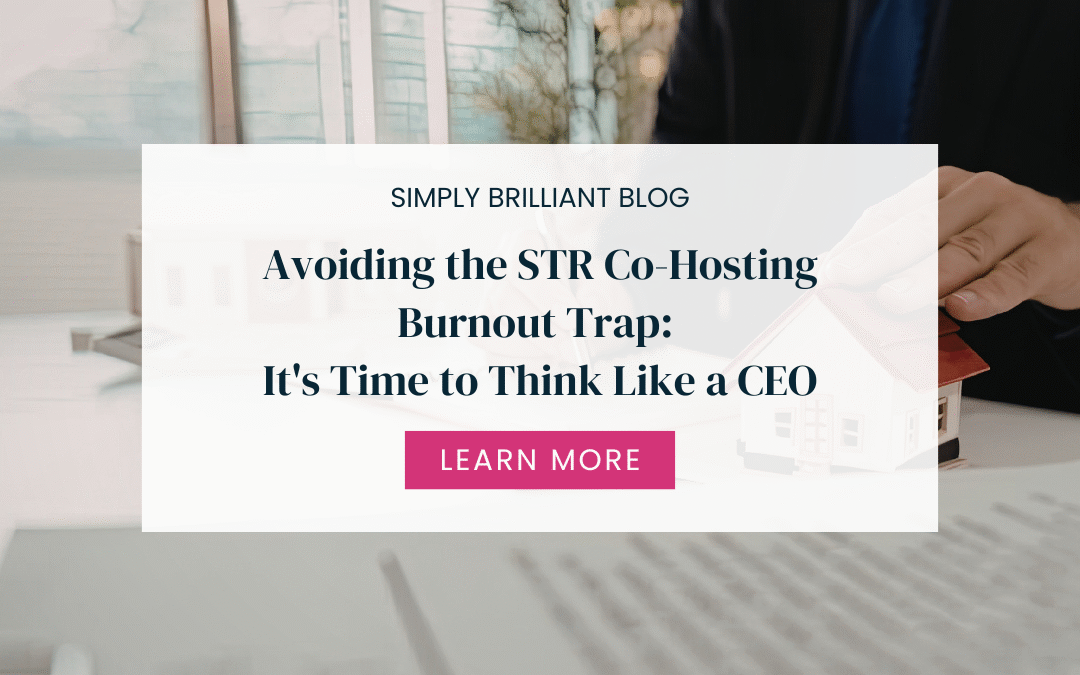
Short-Term Rentals vs. Legacy Vacation Rentals: What Each Side Can Learn From the Other
What separates a solo Airbnb host dealing with everything from cleaning companies, to bookings, to which covers to put on the throw pillows on the bed…from a large, professional vacation rental company? As someone who has proudly had one foot in both worlds—scaling my own portfolio and coaching thousands of other hosts—I see this question all the time.
The truth is, the line between these two models is getting blurrier every day. The debate over short-term rentals vs. legacy vacation rentals isn’t about picking a winner. Instead, it’s about understanding what makes each side successful and borrowing the best strategies to build a stronger, more resilient hospitality business.
Whether you’re an STR host looking to professionalize or a legacy manager curious about the “Airbnb wave,” let’s break it down.
Defining the Two Worlds: Short-Term Rentals vs. Vacation Rentals
At first glance, both sides seem to be doing the same thing: renting properties to travelers. But when you look closer, the mindsets and operational models are fundamentally different.
I like to put it this way:
“The vacation rental industry is filled with professional managers—people who likely don’t own any of the homes in their portfolio, but they know exactly how to run a hospitality operation. STR hosts, on the other hand, often start by listing one property they own and learn how to grow from there.”
The modern STR host is typically an investor with a portfolio of 1–10 units. They often start as a DIY owner-operator, deeply involved in every detail from throw pillows to guest messages. Their focus is on creating a unique, personal experience that shines on platforms like Airbnb and Vrbo.
Legacy Vacation Rental Managers (VRMs), conversely, operate more like traditional corporations. They might manage anywhere from 50 to over 1,000 properties, most of which they don’t own. Their world is built on scalable systems, enterprise-level management tools, and operational consistency.
Key Differences: A Spectrum of Styles, Not Rigid Boxes
Let’s get specific, but with a crucial caveat: the lines between a savvy, scaling host and a small property manager are blurring every single day. There is so much variation in how modern hosts operate now!
Think of these differences less as rigid rules and more as a spectrum. We’ll look at the traditional starting points and common tendencies for each model, recognizing that many successful hosts are already blending these worlds.
- Ownership & Operating Model
- STR Hosts: Often begin by owning their first property, but the model has evolved significantly. The modern STR space is filled with co-hosts and small-scale managers who don’t own the assets but operate on a profit-share or management fee, with their personal brand as a core asset.
- Legacy VRMs: Almost always operate as third-party managers for dozens, if not hundreds, of homeowners, working under formal management contracts.
- Tools & Technology
- STR Hosts: While many start by mastering the tools built into Airbnb and Vrbo, today’s scaling hosts are tech-savvy. They quickly adopt professional-grade Property Management Systems (PMS) like OwnerRez or Hostfully and use dynamic pricing tools to automate operations and maximize revenue, just like the pros.
- Legacy VRMs: Rely from the outset on robust, enterprise-level systems (PMS, channel managers, dedicated revenue software) designed to handle hundreds of properties with maximum efficiency and complex trust accounting.
- Guest Communication
- STR Hosts: The “DIY” host is just one end of the spectrum. Most scaling hosts now act as the CEO of a “team of one,” powered by technology. They leverage automated messaging, AI assistants, and virtual assistant (VA) teams to provide prompt, personal service without being tied to their phones 24/7.
- Legacy VRMs: Guest communication is systemized from day one, typically handled by dedicated in-house staff, call centers, or fully integrated helpdesk software to ensure consistent, branded service at a large scale.
- Marketing & Bookings
- STR Hosts: The primary initial channel is almost always an Online Travel Agency (OTA) like Airbnb. However, building a direct booking brand is a key goal for most professional hosts, often representing a “phase two” strategy after they’ve mastered the platforms.
- Legacy VRMs: Have a long-established focus on a multi-channel strategy. They have invested in building their direct booking websites through Search Engine Optimization (SEO), pay-per-click ads, and email marketing to cultivate a loyal base of repeat guests.
What STR Hosts Can Learn from Legacy Pros
If you’re an STR host who feels stuck in the day-to-day grind, the legacy world offers a masterclass in professionalization.
1. Build a Direct Booking Strategy
Relying 100% on online travel agencies like Airbnb, VRBO, or Booking.com is like building your empire on rented land. Legacy managers know that the key to long-term stability is owning your audience. Start thinking about your direct booking site, learning the basics of SEO, and tracking metrics like bounce rate and time spent on your website within Google Analytics.
2. Implement Structured Operations
You can’t scale if every task depends on you. Legacy VRMs run on Standard Operating Procedures (SOPs), specialized departments, and systematized maintenance. Document your processes for cleaning, guest communication, and inventory checks. This frees you up to work on your business, not just in it.
3. Embrace Professional Revenue Management
Are you still setting your prices manually or just copying your competition? Legacy pros treat pricing as a science. They use dynamic pricing tools (like PriceLabs or Wheelhouse), analyze pacing reports to see how their bookings compare to previous years, and have a deep understanding of market seasonality and local events. Adopting these data-driven strategies is one of the fastest ways to ensure you’re never leaving money on the table.
4. Think Like a Marketer, Not Just a Host
It’s easy to think of your property as just a listing on a platform, but the game has changed. Your reach now extends far beyond the walls of Airbnb. As I’ve said on my livestreams before:
“Your Airbnb listing can now show up on Google. That means you should think like a hotel—or at least a professional property manager—and use keywords in your listing.”
This is huge. It means your listing title and description aren’t just for your Airbnb audience; they are powerful SEO tools. Start asking yourself: what would a guest type into Google to find a place like mine? Weaving keywords like “family-friendly cabin near downtown” or “romantic getaway with hot tub” into your description helps you get discovered by a whole new audience. This simple shift is how you build a business with staying power beyond any single platform.
What Legacy PMs Can Learn from STR Hosts
On the other side, the agile, guest-obsessed mindset of the modern STR host offers powerful lessons for established companies.
1. Master Guest-Centric Design Thinking
STR hosts are experts at creating “Instagrammable” moments. They understand that design isn’t just about furniture; it’s about creating a cozy, memorable, and shareable experience. Legacy PMs can learn to infuse more personality and thoughtful design into their properties to create deeper connections with guests.
2. Be Agile and Adopt New Tools
The STR world moves fast. Hosts are quick to adopt innovative tools that improve the guest experience, like digital guidebooks from TouchStay or beautifully designed welcome packets made in Canva. This agility can help larger companies feel less corporate and more connected.
3. Leverage Storytelling and Modern Branding
Hosts don’t just sell a bed; they sell a story. They use platforms like Instagram, Reels, and TikTok to build an emotional connection with potential guests. This personal branding approach fosters a community around their properties that legacy brands can emulate.
4. Lead with Owner Empathy
Because many STR hosts are their own “client,” they are deeply attuned to the metrics that matter most to a real estate investor: ROI, cash on cash return, and payback period. This owner-centric viewpoint can help large PMs improve their homeowner relations and retention.
The Great Convergence is Here
The exciting part? These two worlds are colliding.
I see it every day: successful STR hosts are scaling up, adopting PMS tools, and building direct booking sites. At the same time, forward-thinking legacy managers are focusing on unique design and host-style branding to stand out.
As I mentioned after attending a recent VRMA (Vacation Rental Management Association) conference, the exchange of knowledge is powerful.
“There’s a ton of education the traditional vacation rental world can offer to short-term rental hosts—and vice versa.”
Experts like Alex Husner, co-host of the Alex & Annie podcast, are championing this new, hybrid approach to hospitality. The future of our industry belongs to those who can blend the systems of a professional manager with the heart of a dedicated host.
Ultimately, the winner of the short-term rentals vs legacy vacation rentals discussion is you—the operator who is willing to learn, adapt, and take the best from both sides.
Ready to level up your STR game with professional strategies while keeping your personal host touch? Join us inside the number one coaching program for women in the world of STRs – the STR Sisterhood Accelerator!




